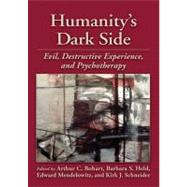
Note: Supplemental materials are not guaranteed with Rental or Used book purchases.
Purchase Benefits
Looking to rent a book? Rent Humanity’s Dark Side Evil, Destructive Experience, and Psychotherapy [ISBN: 9781433811814] for the semester, quarter, and short term or search our site for other textbooks by Bohart, Arthur C.; Held, Barbara S.; Mendelowitz, Edward; Schneider, Kirk J.. Renting a textbook can save you up to 90% from the cost of buying.
| Contributors | p. vii |
| Preface | p. ix |
| Introduction: The Dark Side Metaphor | p. 3 |
| Journeys Beyond the Carl Rogers-Rollo May Debate! | p. 15 |
| Radical Openness to Radical Mystery: Rollo May and the Awe-Based Way | p. 19 |
| Whence the Evil? A Personalistic and Dialogic Perspective | p. 35 |
| Darth Vader, Carl Rogers, and Self-Organizing Wisdom | p. 57 |
| Clinical Encounters With the Dark Side | p. 77 |
| Theogonies and Therapies: A Jungian Perspective on Humanity's Dark Side | p. 83 |
| Decalogue, or How to Live a Life: Engendering Self-Examination | p. 99 |
| Evil: An Experiential Constructivist Understanding | p. 119 |
| When People Do Bad Things: Evil, Suffering, and Dependent Origination | p. 141 |
| The Ubiquity of Evil-And Multimodal Cognitive Treatment of Its Effects | p. 157 |
| Virtue and the Organizational Shadow: Exploring False Innocence and the Paradoxes of Power | p. 167 |
| Broader Implications: Is Psychology a Moral Endeavor? | p. 189 |
| Beyond Good and Evil: Variations on Some Freudian Themes | p. 193 |
| Deny No Evil, Ignore No Evil, Reframe No Evil: Psychology's Moral Agenda | p. 213 |
| Feeling Bad, Being Bad, and the Perils of Personhood | p. 237 |
| Afterword | p. 259 |
| Index | p. 273 |
| About the Editors | p. 289 |
| Table of Contents provided by Ingram. All Rights Reserved. |
The New copy of this book will include any supplemental materials advertised. Please check the title of the book to determine if it should include any access cards, study guides, lab manuals, CDs, etc.
The Used, Rental and eBook copies of this book are not guaranteed to include any supplemental materials. Typically, only the book itself is included. This is true even if the title states it includes any access cards, study guides, lab manuals, CDs, etc.